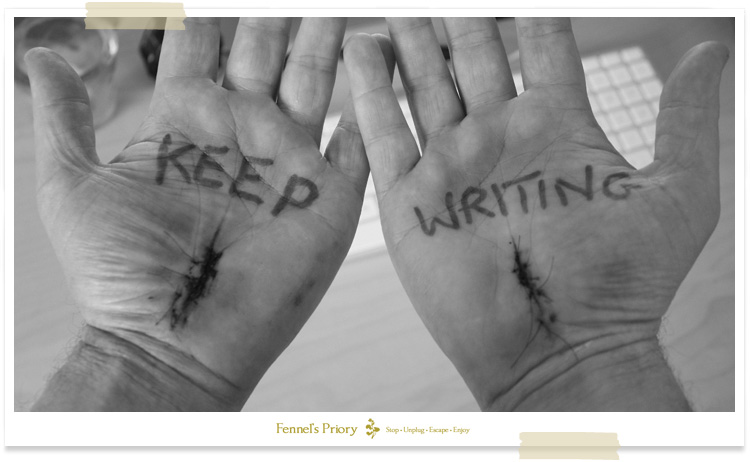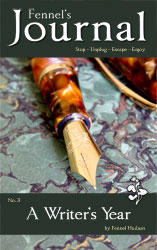Writer's Habit - and Writer's Curse?
Do you, or would you like to, earn your living from writing? You’d be paid 15p for each word of ‘polished copy’ you produce, so your earnings would directly relate to your output. The more you'd write, the more you’d earn. Sounds like a good deal?
Not necessarily so. The creative reward far outweighs the financial one. So if you're only in it for the money, good luck. It's a hard way to earn a living. How do I know? Because it's how I've earned my wage for the past 20 years.
Read the blog, and watch the video above.
Could you make a living as a writer?
How much do you need to earn each year to pay your bills and give you and your family the quality of life that you and they expect? Divide this by 0.15 to give you the number of words you'd need to write – and sell – each year. Then keep dividing to calculate how many you'd need to write and sell each month, week, day, hour.
It's a relentless slog at the keyboard...
Back in 1998, I quit my much loved but poorly-paid job as a gardener and began a career as a writer. I worked in sales & marketing, writing copy for brochures, product labels and advertising campaigns. It supported the writing I was doing in my spare time, where I was penning book chapters and magazine articles under my 'Fennel' pen name. Then in 2008 (when I wrote A Writer's Year), I committed to sharing my work more broadly. So far I've written 14 books, which have collectively sold 60,000 copies, but they pay comparatively little in the way of royalties. The bulk of my income still comes from my day job as a professional copywriter.
For 20 years I have averaged 4,000 words per day in my day job plus 3,500 words per day at home (on my books, blogs and articles). That means I’ve typed 40 million words of finished copy in my career. With the average length of the English word being 4.5 characters, that’s 180 million ‘taps’ upon a keyboard.
All that activity has taken a vicious toll on my hands.
...that isn't without consequence
Three years ago, as I turned 40, I began to notice that my fingers were getting stiffer and swollen, my knuckles ached and I was having trouble unclenching my hands. I began mistyping words (my fingertips weren’t hitting the keyboard where they were supposed to) so I had to revert from touch typing to looking at the keyboard. This slowed down my output and increased editing time. Then I noticed that my forearms had become numb. My hands became tingly and developed a vibrating sensation in their bones, with each tap on the keyboard 'ringing' them like a gong. Ultimately I began to lose strength in my fingers, especially my thumbs; I began struggling to twist door handles and taps at home. And then the final embarrassment: a jar of pickled onions slipped through my fingers in the supermarket, smashing on the floor and causing all manner of stink and chaos.
Doctor's orders
I went to see my doctor. His prognosis revealed a number of things: compressed nerves and tendons in my wrists and forearms, repetitive strain injury, arthritis in my knuckles, and a frenetic 'always on' creative mind that had encouraged my obsession with output. Oh, and I’d developed bad posture and put on three stone due to sitting slumped in front of a word processor for twenty years. Yep, that’s the reality of a professional writer who loves biscuits and doesn’t get enough exercise.
Putting things right
I was referred to a consultant. She advised that, ‘to begin with’, carpal tunnel surgery was required on both wrists. This would release the compression that was preventing the nerves and tendons from moving freely in my hands. I’d be unable to use my hands properly for the first 2-4 weeks after surgery, then it would take 4-6 months for me to regain enough strength to lift heavy objects. If I made a full recovery in terms of dexterity, and still experienced tingling in my forearms, then I’d need surgery in my elbows, shoulders or neck. Possibly all three. This would be a long programme of recovery that would also include a diet, physiotherapy and plenty of exercise. The sedentary writing lifestyle would be no more.
A shock to the system
“Your beliefs become your thoughts,
Your thoughts become your words,
Your words become your actions,
Your actions become your habits,
Your habits become your values,
Your values become your destiny.”
- Mahatma Gandhi
Gandhi's quote is right. We become our habits. My habit is writing, or – more specifically – my daily writing routine. Since 1998 I have risen at 4.30am, written book chapters or articles until 7.30am, then switched to day-job writing for 10 hours before spending the final two hours of the day writing letters or blogs. "I wake, I write." It’s as simple as that. How then would I cope when this cycle was broken by surgery? Fortunately I’d have 14 months to figure it out, such is the waiting time for the operation.
Those 14 months have nearly passed. My operation takes place on 29 March, so I have two weeks remaining to figure out how I'll cope with being unable to write. It’s probable that I’ll catch up on all the reading I’ve wanted to do for ages. But what about my books and blogs? I genuinely don’t know. My publishing schedule will be delayed by a few months, for sure, but it’s likely that I’ll switch to doing video blogs and podcasts each week. I apologise in advance for the inevitable reduction in my writing output or if I miss some Fennel on Friday emails.
Learn from my mistakes
It’s pretty obvious now, looking back, that my approach to writing was riddled with mistakes. My chair was always too low for my desk, causing poor posture and putting too much pressure on my forearms as they leant against the edge of the desk. Keyboards now are much easier to use than the old ‘lumpy keys’ of yesteryear's computers, but I learned to type on an old-fashioned typewriter. So I still hit the keys too hard with my fingertips. And my working days have been too long. 4.30am to midnight, with only 3-4 hours of mealtimes with family is hardly a balanced lifestyle. Much better to immerse myself in family activities, or outdoor exercise, to break the ‘absolute focus’ that has defined my career.
Stop – Unplug – Escape – Enjoy?
I've decided to relax my writing regime. I’ve found ways to earn a living from writing that isn’t paid by the word, such as coaching others to write. I’ve realised the power of ‘writing once and selling many times’ that's possible with books – albeit as a slow-burn source of income. But I still write every day. It’s my habit. An hour a day is my minimum, which is nearly the equivalent to a day a week. Not everyone can clear a day in their diary every week to do what they love, but they can get up an hour earlier each morning to do it without distraction.
Set your routine, create your habit
I will always encourage you to be as creative as you can, as often as you can. But I'll caveat it by saying that input is as important as output. Read as much as you write. And it’s better to keep a notepad and pencil in your pocket and get ‘out there’ than slaving away in your study. Ultimately you should write smartly, earning as much as you can for every word you write or idea you possess. Write once, sell many times.
A writer must write. It's what defines us. Just keep things balanced.
Fill the well, to write well.

 If you like this blog, you'll like Fennel's book A Writer's Year.
If you like this blog, you'll like Fennel's book A Writer's Year.
Please also subscribe to the Fennel on Friday weekly email. You'll receive either a blog, video or podcast sent to you in time for the weekend.



